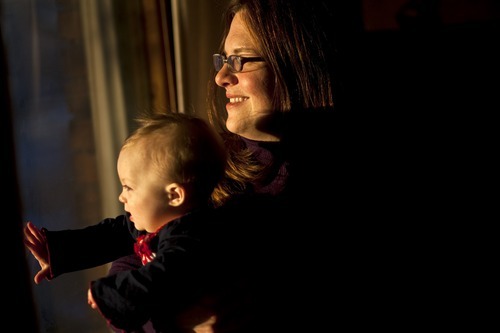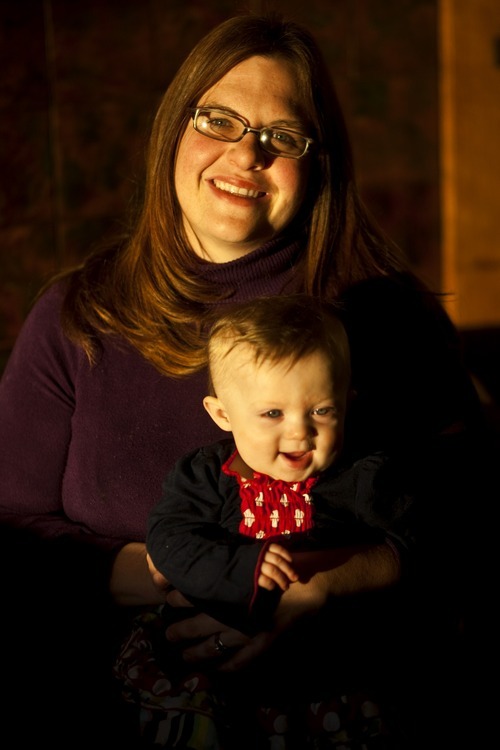This is an archived article that was published on sltrib.com in 2011, and information in the article may be outdated. It is provided only for personal research purposes and may not be reprinted.
The University of Utah has opened the state's first human-milk donation site, where women will be able to drop off frozen breast milk that will go to infants in need.
Christy Porucznik, co-director of the Salt Lake Mothers' Milk Donation Center established this week at the Redwood Health Center in South Salt Lake, said the clinic will be a supply point for the Mothers' Milk Bank in Denver. The bank has eight other donation depots in Colorado, Oregon and Kansas.
"Human milk banking is hugely important. There is never enough," Porucznik said. "I know women who have tried to be donors in the past. The difficulty is all the logistics."
Funded through a grant from the Herbert I. and Elsa B. Michael Foundation, the university-run health center is providing space and staff support for women who have more milk than they need for their own babies.
In Denver, donations are pooled and pasteurized, which kills dangerous viruses while preserving the milk's unique immune properties.
Utah women interested in donating first must go through a telephone pre-screening with the Denver center, which will send those who pass the necessary paperwork a blood-test kit. Staffers at the Redwood center will draw the blood and send it to Denver.
"At our site, we won't be making any decisions about who can be a donor or who can have the milk," Porucznik said. "We are basically a conduit."
Women who get the necessary approvals would collect the milk at home, freeze it and bring it to the Redwood center. Once the center has collected 100 ounces or so, they will ship it to the bank, Porucznik said.
Salt Lake City resident Amanda Esko, 29, said she has already gone through the telephone screening and expects her blood kit to arrive Wednesday. Once she is approved, she will donate a percentage of what she already has saved.
Esko, whose 9½-month-old baby, Pamela Grace, is still nursing, said she had already informally shared some of her milk with a friend who was having difficulty. She heard about the donation center through La Leche League, an international organization that promotes breastfeeding as an important element in the healthy development of the baby and mother.
A public-school teacher, Esko said she's always been community-minded, especially through her church. "This is a way to extend that service," she said. "I wanted to be able to give what extra I have to babies in need."
The milk costs $3.50 to $4 per ounce, is available only by prescription and isn't meant to supply a baby long term.
"The babies who receive milk from milk banks are fragile. They are pre-term, or their mothers for some reason can't provide," Porucznik said.
According to the Mothers' Milk Bank, a program of the Rocky Mountain Children's Health Foundation, the immune properties, growth factors, hormones, enzymes and many other factors present in human milk can't be matched by any commercial formula.
The Mothers' Milk Bank in Denver is the nearest source of donor milk for Utah babies, though there could be a bank here someday, said University of Utah Health Care spokeswoman Rebecca Bingham.
"This would be the first step in that direction," she said.
Esko noted that Americans, even in baby-friendly Utah, are squeamish about public support of breastfeeding. Yet mother's milk, she said, is "the most normal thing available to a child."
"This is normal for my mammalian baby," she said. "It's not until you are a mother that you realize how [much of a] mammal you are." —
Mothers' milk
Donor qualifications established by the Mothers' Milk Bank Medical Advisory Council include:
Women with milk in excess of their own babies' needs.
Excellent health without any chronic illness.
Received no blood or blood products in the past 12 months.
No history of hepatitis (after age 11) or illicit intravenous drug use.
No history of intimate contact with anyone at risk for HIV/AIDS.
Nonsmoker.
Take no regular medication or herbs (except vitamins and minerals, replacement hormones, some birth control preparations).
For more information • http://www.milkbankcolorado.orghealthcare.utah.edu/redwood or e-mail milkdonation@utah.edu.





